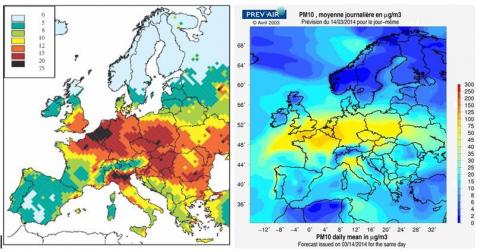
294.501 km. That was the mileage on my car, a 2nd hand Audi A4 diesel (2005) bought in 2008.
So, I decided to buy a new one and wanted to select the most eco-friendly car, or should I say, by ‘essence’, the less eco-harmful.
My selection process involved visiting showrooms and talking to vendors, based on my work/residence/family situation, looking at cradle to grave implications, evaluating Compressed Natural Gas (CNG), pure electric, hybrids and conventional fuels.
Having been a diesel driver for years, a diesel Opel Insignia, with 98 g CO2 was to be my choice when a good friend pointed out the negative health implications of diesel’s micro particules. I was aware of it, Brussels’ air quality is very poor for a start, but never stood still at the scale of the problem.
Digging into this topic with some “google science” and “internet truth”, it occurred to me that diesel could very well be our current and our kids’ asbestos case. A lot of construction companies were active with asbestos in the seventies and eighties, unaware of the related health risks. Without pinpointing a single company, not all the companies were brought in front of a jury, I remembered that a trial took place in Italy earlier this year, relating asbestos poisoning to the deaths of nearly 3.000 people worldwide. And that is just for the local branch of one, single company…
Similar asbestos’ dust, companies, the authorities and the general public appear not to be very concerned with diesel’s negative health implications. Or maybe some want to ignore them for plain financial reasons, vested interests?
There is a loss in life expectancy attributable to the exposure to fine particulate matter, mainly less than 2.5 micrometers (PM2,5). In Belgium, the “loss in statistical life expectancy that can be attributed to the identified anthropogenic contributions to PM2.5 (in months), for the emissions of the year 2000” was 14,9 months. In plan language, that’s a big year. And in cities, guess who seems to be responsible 40 to 85% of the PM2,5 emissions? Right, diesel cars.
Carmakers have been offering root filters on their diesel models for some years now. To quote a salesman on that subject: “I am not sure it works well, given how it should be used for optimal filtering”. Do they correctly work for the nano-particules (PM2,5), not only for PM10? And what about at low exhaust heat, i.e. slow driving in urban areas? If anyone can shed a light here, please feel free to do so.
Some cities are taking some first steps to ban diesels in a near or far future, like Paris (“Nous ne voulons plus de diesel à Paris”), Brussels and Antwerpen.
A 2000-graphic from a ten-year old paper by Austrian’s International Institute for Applied Systems Analysis (IIASA) and an overview particules concentration in 2014 do not visually differ very much… (see top). I am not a scientist: one is for PM10, the other for PM2,5 (even worse I understood), but I believe one can and should extract a general negative message.
Now, there are obviously different causes and reasons, leading us to several possible solutions, and not all the woes can be attributed to diesel cars. As often in this integrated world of ours, picking one solution impedes the benefits of at least one of the other parties involved. A related example, from a ‘pure’ CO2 point of view, is the story I was told that downtown taxi-drivers from Brussels who drop somebody at the national airport in Zaventem are not allowed to bring another person back to Brussels, to protect those taxi-drivers registered in Zaventem.
However, from a grass root point of view for my own, little contribution to improve the air quality on our planet, I bought a regular gas powered stock car (Audi A3 1.4L).
All power sources alternatives have good and bad points, depending on underlying characteristics and assumptions, but the real answer to that question is “No”. From a pure ecological view I should do all my traveling walking or with my bicycle, period. Unfortunately, today, with my current constraints, that is unfeasible… Next up in is sharing public transportation modes. Although their ecological footprint is open for debate, what to include or exclude in the calculation, only consider the marginal costs etc…, I already try to do that as much as possible, but could do better. Shouldn’t we all…? Also those with their company cars..?
P.S. In the future, should you or your friends plan to buy a diesel car, please check the state of its technology at that moment in relation with the micro-particules emmissions in order to make a well-informed choice. Thanks.
P.S.S. If you have any remarks or suggestions, scientifically based preferred, feel free to post your comments.
* http://ec.europa.eu/environment/archives/cafe/activities/pdf/cafe_scenar...
** http://fr.wikipedia.org/wiki/Particules_en_suspension#mediaviewer/File:C...
References:
https://twitter.com/MvanWunnik/status/541640304248750080
http://ec.europa.eu/environment/archives/cafe/activities/pdf/cafe_scenar...
http://www.lesoir.be/712320/article/demain-terre/environnement/2014-11-2...
http://www.ibgebim.be:8080/Pollumetre/Graph.action?lang=en
http://www.euronews.com/2014/11/20/italian-court-frees-swiss-asbestos-po...
http://www.lejdd.fr/JDD-Paris/Anne-Hidalgo-Nous-ne-voulons-plus-de-diese...
http://www.bbc.com/news/world-europe-30368504
http://www.notre-planete.info/actualites/actu_3399_diesel_cancerigene.php
http://fr.wikipedia.org/wiki/Particules_en_suspension
http://www.respire-asso.org/pollution-diesel-ces-voix-qui-se-font-lavoca...
http://www.unece.org/fileadmin/DAM/env/documents/2004/eb/wg1/eb.air.wg1....